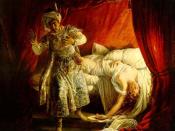How do the ideas and language of the speeches in this scene help to reveal different attitudes we observe in the play to Othello's blackness/otherness?
The dialect in 'Othello' plays a vital role in the play as the audience understands how people treat Othello and how they subtly insult him. In an era where black people were mistreated and were not as equal to their white counter parts Shakespeare uses race as a key theme to distance Othello from the other white characters, so the audience can see the different attitudes from the other characters towards Othello.
Firstly, Roderigo addresses Othello to Brabantio as a 'Moor' the term 'Moor' was used to refer to North Africans, West Africans or, even more loosely, for non-whites or Muslims of any origin. North and West Africans living in Elizabethan England were frequently singled out for their unusual dress, behaviour and customs and were commonly referred to as "devils" or "villains."
Moors were commonly stereotyped as sexually overactive, prone to jealousy and generally wicked. What Roderigo is doing is getting Brabantio even more angry by subliminally putting explicit images of Othello and Desdemona in his head which will make Brabantio who is a very powerful man want to either imprison or kill Othello.
The moment Brabantio walks into the room he shouts 'Down with him, thief!' this shows the complete and utter disrespect towards Othello who is higher up than Iago, but is treated like a scum. The noun 'thief' implies that Othello has stolen something from Brabantio(Desdemona). This tells the audience that Brabantio doesn't think that Othello is a worthy enough to have his daughter as a wife because he is black, the reason I get this impression is because Othello us very high up in his...


